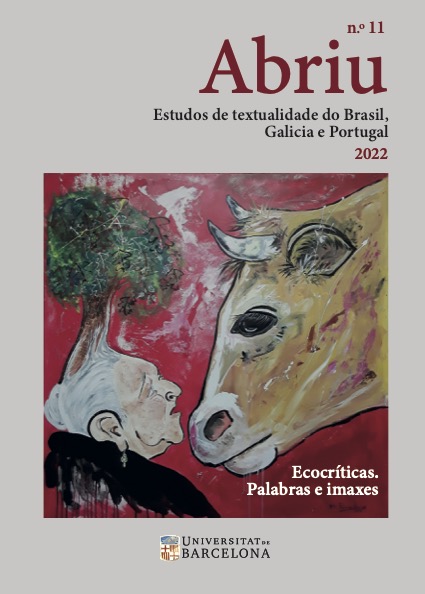Tres poemas de Luísa Villalta
DOI:
https://doi.org/10.1344/abriu2022.11.14Palavras-chave:
poesia visual, fotografía, imaxe antropomórfica, símboloResumo
Escollín para a análise tres poemas entre os que compoñen o conxunto de vinte do libro Papagaio, composto por fotografías de Maribel Longueira interpretadas por Luisa Villalta. Trátase dos tres textos que dialogan en posición de maior proximidade coa ollada antropomórfica da fotógrafa.
O primeiro describe e interpreta o cromatismo popular do ámbito prostibulario suxerido através da foto da entrada e as esqueiras de acceso a unha vivenda. A poeta, alén da perspectiva simbólica destinada á lectura da cor, constrúe a imaxe das pernas e o sexo da casa antropomorfizada.
O segundo poema elabora un relato de base simbólica a partir da fotografía da pechadura dunha porta arruinada, complementado pola identificación formal e significativa do oco co ollo vixiante e fiscalizador que representa o control moral exercido polo poder e asumido pola sociedade tradicional.
O terceiro tece un discurso reflexivo suscitado pola visión de dúas xanelas que propicia a reconstrución da vida das mulleres que habitaran aquelas alcobas. É un complexo poema alegórico arredor da mudanza das relacións de amizade e o deterioro corporal –identificábel co proceso da ruína arquitectónica-, que sitúa en primeiro plano as bocas e as cordas de tender a roupa, identificábeis cos vínculos afectivos.
Downloads
Publicado
Como Citar
Edição
Seção
Licença
Copyright (c) 2021 Xosé María Álvarez Cáccamo

Este trabalho está licenciado sob uma licença Creative Commons Attribution-NonCommercial-NoDerivatives 4.0 International License.
Os autores conservam os direitos e outorgam a Abriu: estudos de textualidade do Brasil, Galicia e Portugal o direito da primeira publicação, a partir da qual a obra estará disponível simultaneamente sob uma Licença de Reconhecimento-NãoComercial-SemObraDerivada (CC BY-NC-ND) que permite partilhar a obra com terceiros desde que reconheçam a autoria e a publicação inicial nesta revista.



